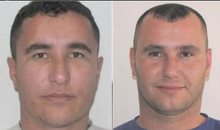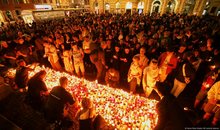
 Flash News
Flash News
3 Albanians, part of criminal organizations, extradited to Italy
A 26-year-old man is arrested for the armed conflict in Ali Dem
Quarrel between neighbors in Patos, 35-year-old injured with screwdriver
Accident on the Krahes-Memaliaj axis, a 65-year-old man is injured
The Ministry of Agriculture confirms 4 outbreaks of cattle plague in different areas of Albania
European countries where there is greater inequality of wealth, how is Albania ranked?
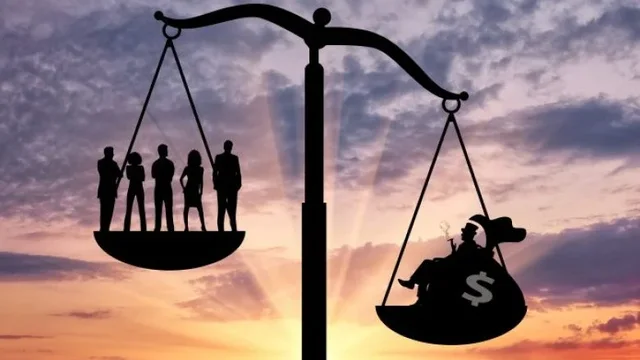
Experts suggest that tax systems and home ownership rates play an important role in wealth disparities between the rich and the poor.
Wealth inequality is very visible around the world and Europe is no exception: the richest 10% on the continent own 67% of the wealth, while the bottom half owns only 1.2% of it.
The extent to which wealth is unevenly distributed also varies considerably from country to country, as shown by the Credit Suisse and UBS Global Wealth Report 2023.
Net worth, or "wealth", is defined as the value of financial assets plus real assets (mainly housing) owned by households, minus their debts.
Unequal distribution is measured by the Gini coefficient: the higher the Gini coefficient, the more wealth inequality there is, where 0 represents complete equality.
Among the 36 European countries studied, wealth inequality in 2022 ranged from 50.8 in Slovakia to 87.4 in Sweden.
Excluding Iceland, wealth inequality was quite high in all the Nordic countries. Finland, Denmark, Norway and Sweden were ranked in the top half of the table, with Sweden leading the list.
Germany had the highest wealth inequality score (77.2) among the EU's "big four" economies, followed by France (70.3), Spain (68.3) and Italy (67.8). The United Kingdom had a score of 70.2.
Belgium (59.6), Malta (60.9) and Slovenia (64.4) followed Slovakia with the lowest wealth inequality.
In Albania, wealth inequality is higher than in Montenegro, Italy and Greece, but lower than in Serbia. In our country, the Gini coefficient is 68.6.
Huge inequalities between the richest
Looking at the top ten richest in 2022, Sweden had the greatest wealth inequality, with 10% owning 74.4% of the wealth. Belgium had the lowest inequality value. with 43.5%.
In fact, the top 10 owned over half the wealth in every country except Belgium.
Among the EU's 'big four', Germany had the greatest wealth inequality, with the richest 10% owning 63% of the wealth, followed by France (54.9%), Spain (53.8%) and Italy (53.5 %). Great Britain had the lowest figure of all four countries at 53.3%.
Excluding Germany, the ten richest of Europe's four economic powers had relatively lower inequality figures among the 21 countries.
The ranking remains largely unchanged when comparing the wealthiest 5% to the top 10%. Sweden led the way, with the richest 5% owning 60.3% of the wealth, while Belgium had the lowest wealth inequality, with the top 5% owning 30.8% of the wealth.
Looking at the top 1%, Turkey had the highest figure at 39.5%, followed by the Czech Republic (37.8%), Sweden (35.8%) and Germany (30.%).
The top 1% in Belgium was well below the average, with the richest 1% owning only 13.5% of the wealth there. The next lowest figure was 19% in Portugal.
Why is Sweden at the top of wealth inequality?
It may come as a surprise to see the Nordic countries in general scoring so highly on wealth inequality, especially since they seem to perform very well on other indices, such as well-being, disposable income and democratic values.
The tax system is the most significant reason why Sweden in particular goes against it, according to Dr. Lisa Pelling, head of the Stockholm-based research institute Arena Idé.
"Over the past few decades, we've eliminated a number of wealth taxes," she said. "In Sweden, there is currently no wealth tax. There is also no inheritance, gift and estate tax.”
She said that successful international Swedish companies, which have benefited from investments made with taxpayers' money, are not returning those funds.
"We also have very low taxes for companies. This means that there are many opportunities for rich people to get even richer," added Pelling. / Euronews
Latest news


3 Albanians, part of criminal organizations, extradited to Italy
2025-06-12 13:59:15
A 26-year-old man is arrested for the armed conflict in Ali Dem
2025-06-12 13:40:31
Report/ Albania worsens in gender equality index
2025-06-12 13:40:14

Quarrel between neighbors in Patos, 35-year-old injured with screwdriver
2025-06-12 13:07:05

Accident on the Krahes-Memaliaj axis, a 65-year-old man is injured
2025-06-12 12:45:49
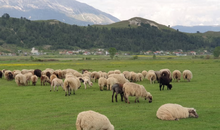

Demand a recount of votes in Tirana, the Court dismisses Alimehmet's case
2025-06-12 12:22:08
Suffering cardiac arrest, vacationer dies on Qerret beach
2025-06-12 12:05:48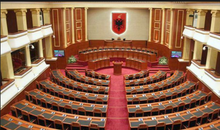
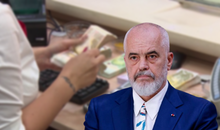
The market is "demanding" a minimum wage increase
2025-06-12 11:52:37

Alarm on the coast/ Elderly woman from Kosovo risks drowning!
2025-06-12 11:25:51
The hearing for "Golden Bullet" is postponed due to the lack of lawyers.
2025-06-12 11:06:27
The Special Court schedules the hearing for the “Partizani” case
2025-06-12 11:00:42
"We work to steal"/ Berisha releases Rama's video: The first time he is honest!
2025-06-12 10:52:11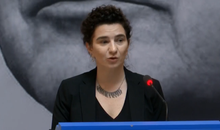


US limits non-essential staff at embassy in Iraq after rising tensions with Iran
2025-06-12 10:19:44

Hero in Greece/ Albanian immigrant saves two children from drowning in river
2025-06-12 09:52:46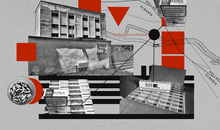
Albanian Customs Officials Crack Down on Cigarette Smuggling Business
2025-06-12 09:37:17

26 years of freedom! Kosovo marks Liberation Day today
2025-06-12 09:14:19
Clear skies across the country, weather forecast for today
2025-06-12 09:03:08
The level of salaries in construction and tourism remains below average
2025-06-12 08:49:54


Murder in Xibar i Klos/ Hazbi Velsula, the victim's cousin, in custody
2025-06-12 08:23:45
Morning Post/ In 2 lines: What mattered yesterday in Albania
2025-06-12 08:09:51

Bylykbashi: The EPP Assembly adopted the strongest resolution in this forum
2025-06-11 22:46:15
A person is found dead in Klos, suspected of being murdered
2025-06-11 22:33:38


Rape the cleaning worker in Athens, the Greek police declare the Albanian wanted
2025-06-11 21:30:13
Disappointment with Latvia, Elseid Hysaj reacts after disappointing transfer
2025-06-11 21:15:08

EU: New package of sanctions against Russia focuses on energy and finance
2025-06-11 20:51:17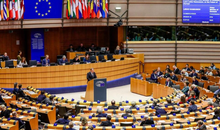

Scandal in Lezhë/ The apartment is covered by sewage
2025-06-11 20:37:59
Rural schools left behind in the use of digital tools
2025-06-11 20:09:51
Kosovo bans import of sheep and goats from Albania
2025-06-11 20:01:17
Shot in the head, former Albanian policeman dies after 3 days
2025-06-11 19:41:08


Weather-shaping factors: How cloud-dwelling microbes affect our lives
2025-06-11 19:01:22



Immigration policies/ Famous TikToker leaves the US
2025-06-11 18:20:30



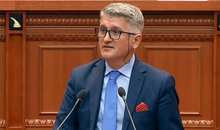



Renowned QSUT doctor passes away
2025-06-11 17:03:30
Photo/ Van catches fire on the Fier-Lushnje highway
2025-06-11 16:54:35
Kurti confirms agreement with US on immigrants: We will accommodate 50 people
2025-06-11 16:42:50
Poll/ Do you believe that the vote recount will change the result of May 11?
2025-06-11 16:31:21
Martin Can's murder, 6 people testify in closed-door session
2025-06-11 16:28:14
The silent tragedy! 56 suicides have been recorded in the country since January
2025-06-11 16:20:06
First case of monkeypox identified in Albania
2025-06-11 16:13:18


Ukraine repatriates bodies of soldiers killed by Russia
2025-06-11 15:37:13
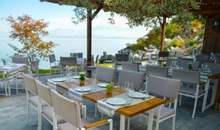


Menopause, tips for a healthier transition
2025-06-11 15:03:00
A person was violently robbed, a serial thief was arrested in Durrës
2025-06-11 14:48:43
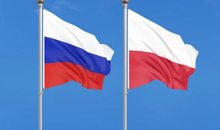
Tensions with Russia return, Poland arrests 28-year-old for spying for Moscow
2025-06-11 14:33:58
Foreign tourist dies in Saranda, initial suspicions
2025-06-11 14:14:38
A person was injured with a knife in Kuçova, the 26-year-old was arrested
2025-06-11 14:08:51
Nuclear tensions rise as Iran and US disagree on date for talks
2025-06-11 14:00:32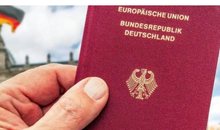

'Sterilization' trial postponed, here's when the next hearing will be held
2025-06-11 13:44:18
Greece considers banning burqa in universities
2025-06-11 13:36:04

Curvy roads and looking at your phone make you nauseous? Find out why
2025-06-11 13:20:18


List/ What are the teams qualified so far for the 2026 World Cup?
2025-06-11 12:54:56


OVERDOSE
2025-06-11 12:38:27
Kosovo government rejects US request to shelter immigrants from third countries
2025-06-11 12:32:01

By-elections in 3 municipalities remain in Rama's hands, despite the law
2025-06-11 12:12:33
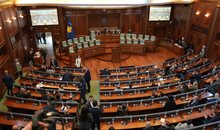
The attempt to constitute the Kosovo Assembly fails for the 30th time
2025-06-11 11:57:14
